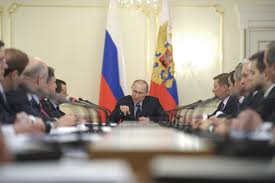I cannot exclude the possibility that Vladimir Putin is really afraid of NATO expansion into Ukraine and, unable to keep a pro-Russian president there, opted to destabilize the state in order to prevent NATO membership for Ukraine on that ground. Still, I think that the more important motivation appeared from domestic politics: Putin's main fear is "color revolution" or a victorious Maidan. So his main task from the very beginning of the crisis was to spoil the Maidan victory and turn any anti-government protesters into not just U.S. puppets, but "fascists." The proxy war was just a result of the policy of delegitimizing the Maidan (in the eyes of Russians, first of all). —PONARS Eurasia Member
Yes, it seemed cheaper and less risky than Russian military intervention—true of working with warlords everywhere, which is something Putin had already done in Georgia and Chechnya. His ultimate goal was to threaten the stability of the government in Kiev, assuring more Russian influence in Ukraine in the future, and keeping the country out of NATO. But the warlords got away from him, as warlords often do—it is very difficult to even monitor, much less control, what is happening when a state chooses to outsource military conflicts to local contractors. —Kimberly Marten
The proxy war was not necessarily the initial plan, but it fits with the current circumstances and Putin's overarching goal, which is preventing any additional border states from joining the Western institutions of the EU or NATO (the possibility of which Putin and his advisors exaggerate in their own minds). —PONARS Eurasia Member
Moscow needs destabilization in eastern Ukraine without Russia being involved directly. Direct military invasion would entail a very high price internationally (more probability of sanctions and ultimately diplomatic isolation). The Kremlin wishes to capitalize on the obvious vulnerabilities of Ukraine, to divert Ukrainian resources into waging the war, and then create in Donbas a fully controllable quasi-state a la Abkhazia, South Ossetia, or Transnistria. In Putin's logic, this will boost his domestic popularity and give him leverage for pressuring Kyiv. —Andrey Makarychev
Russia is running a proxy war in Ukraine because proxy wars worked very well to serve Russia's interests in Azerbaijan, Georgia, Moldova, and Tajikistan. Russia successfully punished independent minded governments or challengers and brought them in line with Russia's interests through proxy wars, and it faced almost no significant resistance from Western powers in doing this in many other formerly Soviet states. Given Russia's "success" in annexing Crimea with no tangible resistance or costs, it seems like this strategy initially succeeded in Ukraine as well. Putin can now use secessionism in Donbas as a bargaining chip to maintain or bring to power a pro-Russian government in Ukraine. —Şener Aktürk
In my view, Putin is deeply afraid of the spread of the Maidan from Ukraine to Russia, and attempted to prevent it at any cost. He also perceives Ukrainian domestic developments as Western encroachment into 'his' sphere of influence and attempted to counter it in one way or another. —PONARS Eurasia Member
His life principle, borrowed from his favorite movie character in The Sword and the Shield, a Soviet World War II spy thriller: "To give orders to as many people as possible and to take orders from as few people as possible." His objective is to rule as long as possible over Russia while expanding Russia's rule and influence as far as possible, wherever he can find an opening (which often makes his actions appear opportunistic while they still remain consistent with his basic motivation and long-term objective). The most cherished specific goal is a Russia-dominated political and economic union of the former Soviet republics, a quasi USSR 2.0 (but without the Communist Party). After the popular protests in Ukraine got rid of Yanukovych it became obvious that a free and democratic Ukraine would inexorably move into EU and out of Moscow's reach. And without Ukraine, a USSR 2.0 is infeasible. So he will keep destabilizing any genuinely democratic government in Ukraine. Putin's target date for USSR 2.0 is December 30, 2022—the 100th anniversary of the founding of the Soviet Union. As the leader of this new entity/union, Putin can stay in power indefinitely after his second 6-year presidential term expires in 2024, so the timing here is opportune. Putin understands that if he reveals this goal outright, he will encounter opposition within the former Soviet republics and in the West, hence, his strategy is to obfuscate, to dodge, to change pace and direction seemingly haphazardly, two steps forward, three steps sideways, with a mix of military, economic, political, ideational (church) and interpersonal (kompromat) policy tools, moving from one fait accompli (like Crimea) to the next. —PONARS Eurasia Member
A proxy war in Ukraine's eastern regions pays higher dividends to Russia than outright annexation. The conflict is likely to end with a political settlement that significantly empowers the eastern regions; the regions will technically remain part of Ukraine but will be dominated by elites with close ties to Russia. Such a settlement will disable Ukraine for decades to come and make the country less attractive to the EU and NATO, even for the most minimal partnerships. Russia has a higher tolerance for weak neighbors than Europe does. —PONARS Eurasia Member
He is surely running a war there. I would not call it a proxy war, though, as the level of Russian participation is so high that this would qualify more as a direct military confrontation. Without Russian interference there would be no hostilities there, and surely not on the scale that we are seeing. —Volodymyr Dubovyk
No, but he is allowing a proxy war to be pursued without his direct participation. Knowing that there have always been Russian politicians eager to militarily intervene in the Baltics, Serbia, Georgia, etc., Putin knew by simply doing nothing to prevent the prosecution of the proxy war in eastern Ukraine, he would get the result he sought, but with plausible deniability. Having unleashed the war, he now has a Frankenstein to rein in. First step: close the border. At least then the rebels will only have their own resources for the rest of the conflict. —PONARS Eurasia Member
Putin's aggression in Ukraine is driven by his need to stay in power. Since this need is ongoing, he is not going to back down in Ukraine and will continue supplying material and volunteers. Putin's behavior suggests that he thinks that if he does not constantly increase the level of repression in Russia or does not constantly oppose Russian society against external enemies, large street protests will seek to overthrow him. Snuffing out even the tiniest embers of opposition seems like a recipe for ultimately creating a social explosion unless, of course, ultimately there are simply too few people left willing to take any political action. —Robert Orttung
Putin is running a proxy war in Ukraine, as he wants to control this country, keeping it weak and unstable, as well as unattractive for the European and Euro-Atlantic structures. Also, Putin demonstrates to Ukrainian authorities that he is an important player, who controls the situation and whose interests they are to account anyway. Otherwise the small proxy war might turn into a big and direct one. —PONARS Eurasia Member
The order above is random. Comments were collected July 23-24, 2014 (Wednesday noon to Thursday noon EST). Providing a name was optional. All comments are by PONARS Eurasia members. The statements made and views expressed are solely the responsibility of the individual author.











